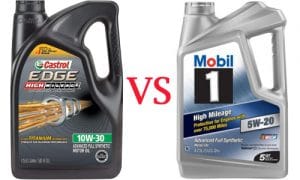
Still, when it comes right down to it, you want to trust the health of your car to a company who has the experience to serve their customers well for decades. Two such companies are Castrol and Mobil 1, who are actually subsidiary companies of some of the largest petrol corporations in the world. That said, how do these 2 giants stack up when compared to one another. Does anyone have an edge, and if so, for what products?
| Type | Model |
|---|---|
| Standard Conventional | Castrol GTX |
| Standard Synthetic Blend | Mobil Super |
| Standard Full Synthetic | Mobil 1 Annual Protection |
| Performance Full Synthetic | Mobil 1 Racing |
| High Mileage Synthetic Blend | Castrol GTX High-Mileage |
| High Mileage Full Synthetic | Mobil 1 Extended Performance High-Mileage |
| Restore Synthetic Blend | Castrol GTX Ultraclean |
| Restore Full Synthetic | Castrol GTX Magnatec |
| Diesel Conventional | Castrol GTX Diesel |
| Diesel Full Synthetic | Mobil Delvac 1 ESP |
Castrol Oils
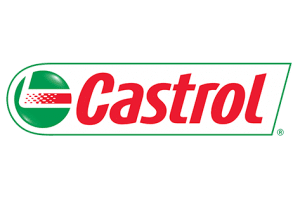
This means that if your vehicle requires no special manufacturer’s maintenance, Castrol is a great option.
A Company History
The Castrol company actually started as a small start-up in the 19th century in London as CC Wakefield & Co. From those humble beginnings, Castrol was born, though the name itself is simply a portmanteau of Castor Oil which was one of the primary ingredients in the original formula. These days, Castrol is actually a subsidiary company of the petroleum giant, BP. That said, these days, Castrol actually provides high-quality lubricants to virtually every market–including aeronautical space engineering for NASA. However, the primary crux of the company relies on the sales of high-quality consumer-grade motor oil for the average driver.
Most Popular Brands
Castrol likely blurs the line between actual brands and particular lineups, where you could reasonably say there are 2 brands of motor oil: Edge and GTX. However, due to the way that Castrol markets their products, they often include niche motor oil products as separate brands. To make matters simple, just think of the GTX brand as their “standard” brand and Edge as Castrol’s “premium” brand. This is especially true given that most of the different niche “brands” appear in both GTX and Edge formulas. It is also worth remembering that even between these two brands, most Castrol motor oil still targets a more general driver.
Castrol Edge
As Castrol’s premium brand of motor oil, the Edge lineup predictably performs better than the GTX lineup. That said, there is a good chance a most of this increase in performance is due to the fact that the Edge brand comes exclusively in full synthetic formulas while the GTX brand has only a single full synthetic product in its lineup. It is also worth noting that of the “niche” products that Castrol also categorizes as individual brands, the only shared type between the Edge and GTX brands is the High Mileage type. This is also where you will find Castrol’s motor oil for supercars.
 Castrol GTX
Castrol GTX
Despite not being the “premium” brand of the Castrol motor oil lineups, the GTX is not inherently a bad motor oil. In fact, the GTX lives primarily in the province of non-full synthetic oils. Outside of a singular product, the GTX covers synthetic blends and conventional oils more than anything else. It is also worth noting that most of the “niche” brands in the Castrol lineup are ultimately GTX products. The GTX caters to a number of older vehicles as well as those which run on diesel fuel.
GTX brand products are generally not full synthetic oils, but they still contain the wealth of the additives that Castrol products are known for.
Castrol Ultraclean
This begins the “niche” brands of which the Ultraclean is technically within the GTX umbrella. Even more interesting, the Ultraclean “brand” is part of the synthetic blend lineup that Castrol carries–something it can boast over Mobil motor oils. As the name suggests, the GTX Ultraclean is designed to clean out the sludge and gunk in an older or poorly cared for engine. In this regard, it is not nearly as strong as a true engine flush, but it still offers far more potent detergents and dispersants than your average “cleaning” motor oil. This is especially good for Castrol in particular as Mobil does not focus as much on restoring as much as they do on maintaining.
Castrol GTX Magnatec
From Castrol’s perspective, once you have cleaned and flushed your engine out, you then need to provide your newly clean engine with protection. That is where the Magnatec niche “brand” comes into play as it is specifically designed to help condition, repair, and strengthen the raw metals of your power system. It is also worth noting that the Magnatec lineup within the GTX brand is also the only full synthetic GTX motor oil that Castrol sells. Regardless, the Magnatec motor oil comes not only with the common antiwear and rust-inhibiting agents, but it also has magnetically charged materials that fill in the damage left from time past.
Having been around for over a century comes with some advantages and one of the biggest is connections. Castrol definitely takes advantage of the connections it has been able to build over the past century by working hand-in-hand with the makers of its products when developing their own. As such, virtually every Castrol motor oil is recommended within its given sphere of influence by car makers that push the boundaries of their own automotive engineering feats. One area that BP could stand to work on is its involvement in combating some of the issues their products can cause–an area where Mobil holds a distinct advantage.
Mobil’s Story

Company History
Mobil has been a major player in the petroleum markets pretty much since its founding over a century ago. Originally a vacuum oil, Mobil was eventually purchased by Standard Oil which begins the long process of Mobil becoming the lubricant powerhouse that it is today. Of course, after the dissolution of Standard Oil, Mobil was owned by Jersey Standard which eventually renamed itself Exxon. It is worth noting that Mobil was once a much larger brand than it is today, though it still holds a fairly sizeable share in the motor oil market–especially for any performance-heavy application.
Most Popular Brands
Mobil 1
This is Mobil’s premium brand, and they have gone all in with this direction, pouring the overwhelming majority of their research and marketing into developing this brand over their others. In fairness, the Mobil 1 brand does truly live up to its billing as a premium brand of motor oil, but this will also exclude a fair number of consumers from the brand. If your engine is not newish and in decent condition, the Mobil 1 brand may not be the best choice–at least, not until you get the engine in better condition. Still, if you have anything resembling a new model or high-performance engine, this is the brand to use.
 Mobil Super
Mobil Super
Mobil Super seems like a cheap way to make your standard line of oils seem more impressive. This is made all the more obvious with the fact that the brand does not contain many products and focused more on non-full synthetic motor oils.
The Mobil Super brand is not a bad motor oil, but the company does not put nearly as much effort into formulating these products as they do their flagship brand.
This shows up most prominently in the sheer disparity of products in each brand, but the Mobil Super brand does not even have much proprietary technology included in their formula like Castrol.
 Mobil Delvac
Mobil Delvac
This is definitely a unique brand in that it is the only brand between the 2 companies that are specially formulated for diesel engines of a commercial grade or higher. This means that farmers, truckers, and construction crews will have little choice if they have to choose between Mobil and Castrol. That said, Mobil goes a step further by ensuring that they offer both conventional and full synthetic formulas of this heavy-duty motor oil. Still, even Mobil only offers 2 different models, so the pickings are still fairly slim. On top of that, the Delvac brand is designed more for highway driving than industrial or agricultural purposes.
Niche Models
“Niche Models,” in this instance, refer to various common types of marketing groups that different motor oil companies all use but for which there is no objective standard. Some of these niches force a standard of sorts by limiting their application, but by and large, each company is free to define what any of these niches mean for their particular products. As such, this is where you will begin to see the different companies, and even their requisite brands, begin to separate and distinguish themselves. If you are looking for a place to truly judge the different motor oil companies, the niche markets are where you will find the biggest gaps.
Cleaning
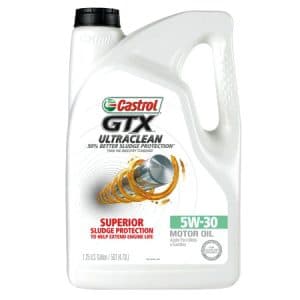
Between Castrol and Mobil, Castrol has the clear advantage of having put significantly more research into their cleaning motor oils. Mobil does not generally focus on engines in poor condition and instead assume the engine is in good condition when using their oil, though they do include cleaning agents in their oils.
Preserving
This is by far the most common type of motor oil model sold considering most people are interested in maintaining the investment of their car more than they are pushing it the limits. There are a wide range of different additives included to preserve your engine, but antiwear, anti-friction, and rust-inhibitors are the most common. In terms of performance preservation, Mobil 1 will continue its dominance.
However, for engines that use conventional motor oil, the Magnatec additives put Castrol neck and neck for the consumer-grade market. Still, Mobil and Mobil 1, in particular, have a tendency to provide better preserving qualities than Castrol.
Diesel
These are fairly straightforward and fairly slim in terms of the offerings. This has a lot to do with the fact that more and more motor oils are being made to work equally well with both diesel and gasoline engines. That said, there are still plenty of older diesel engines out there that will not work with the full synthetic motor oils that can work with either fuel. In this instance, neither company really has the advantage for consumer-grade diesel engines, though Mobil 1 does offer a performance diesel oil. On top of that, Mobil also makes a diesel motor oil to work specifically for commercial trucks with more than 3 axles.
High-Mileage
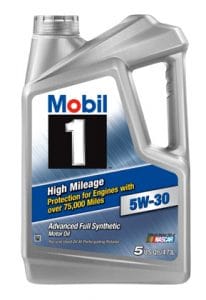
Another quality most high-mileage motor will have is viscosity additives to make it easier on an older engine. Mobil’s brand of Mobil 1 High-Mileage motor oil is actually the highest-rated high-mileage motor oil.
Performance
This niche of motor oil includes all formulas which are specifically designed to work with high-performance engines. This can include anything from a local Honda tuner car all the way to professional racing vehicles. Between the 2 companies, Mobil easily outpaces Castrol with their Mobil 1 brand providing numerous entries in the Performance niche markets. In fact, Mobil 1 Performance motor oils offer a full range of options that are specifically suited for the particular grade of performance engine you own. As such, the driver of a tuner car should not use the same Performance motor oil that a driver of a supercar should use. It is also worth noting that Castrol does not cater to racing motors within their consumer brands.
Heavy Duty
Despite what the name may seem to imply, “Heavy Duty” motor oils are not really meant for consumer-grade vehicles. This means motorcycles, cars, trucks, and SUVs may be put through their paces, but still do not require Heavy Duty motor oil. It is also important to distinguish between Performance and Heavy Duty oil as the former is meant for tuned engines.
Heavy Duty motor oil is meant for the various pieces of industrial equipment that consumers often own.
Tractors and other types of agricultural equipment or other types of heavy equipment will use Heavy Duty oil. The Mobil Delvac brand of motor oil is the only one sold to the public between either company.
Motor Oil Viscosity Types
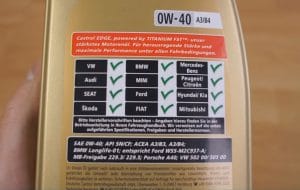
- The First Number – The first number will tell you what the viscosity of the motor oil at freezing temperatures will be. The higher the number the better the oil will be able to maintain its viscosity, even if temperatures drop to freezing lows. It is worth noting that you can actually add pour-point depressants to the oil to increase its performance in cold-weather conditions. Still, with a motor oil with a natural freezing viscosity rating of 20, Castrol has a distinct advantage over Mobil in this market. That said, 20wXX motor oil is often not necessary, even if you live in the northern part of the country.
- The Second Number – Whereas the first number tells you how the motor oil will respond in cold-weather conditions, the second number tells you what to expect once the engine gets hot. Just like with the first number, the higher the second number the better, though at this point the risk is of the oil being too thin not too thick. Once again, Castrol offers the widest range of viscosities for hot temperatures with a 10w60 motor oil. That said, Mobil is the company with the new Japanese-style 0w16 motor oil. This motor oil is amazingly good for fuel economy, but it requires significant additives to account for its thinner viscosity.
Base Types
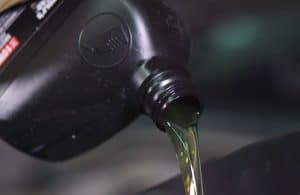
Full Synthetic
This is quickly becoming the most common type of consumer motor oil sold, and it is not hard to see why. Full synthetic motor oils outperform both conventional and synthetic blends in virtually every head-to-head comparison. The only thing that can hold a full synthetic motor oil back compared to the other types is compatibility–though that is quickly becoming a thing of the past as well. Regardless, when comparing Castrol and Mobil in the full synthetic category, Mobil takes a fairly commanding lead with most of their products centered on this type.
Synthetic Blend
As the name suggests, a synthetic blend will combine ingredients from both conventional and synthetic motor oils. This allows the oil to work better with older engines while still offering an improved performance over pure conventional motor oil. This is the market that could be wide open were it not for the fact that Castrol, with a superior conventional motor oil lineup, is able to generally produce better synthetic blend motor oils as a result. That said, this category is probably where the 2 companies are the closest and it could very well be a toss-up–unless you need a deep-clean.
Conventional
This is the least common type of motor oil sold for consumer automobiles today, but there are still plenty of older engines on other types of equipment that require conventional motor oil. It is also the only type of motor oil that can be used for engines past a certain age. This type of motor oil is made with “pure” petroleum products alone as well as whatever additives the company includes. It is not as good at providing long-term lubrication, but it is often less expensive. Castrol offers more and better options within the conventional oil market.
Overall

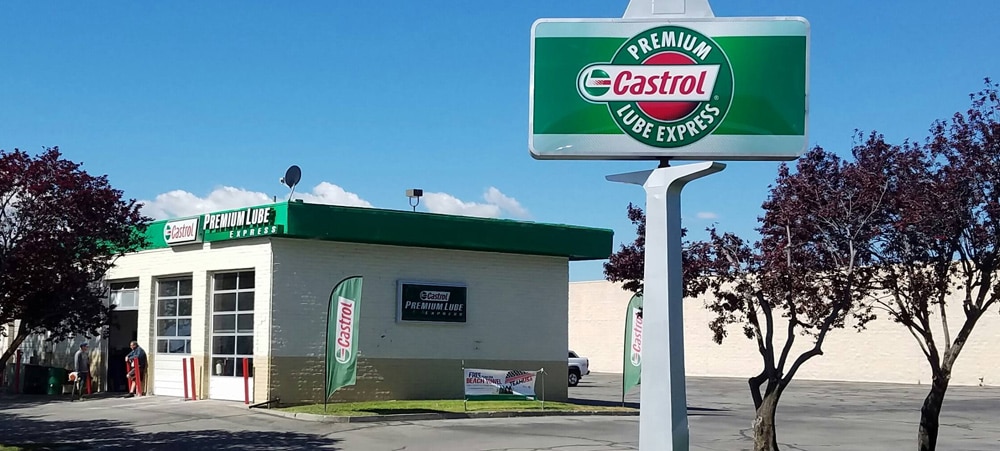

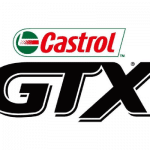 Castrol GTX
Castrol GTX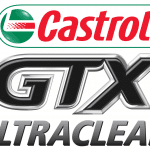


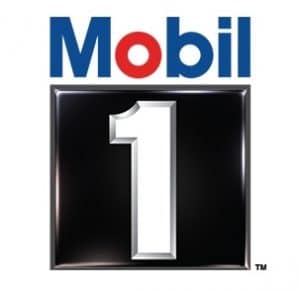
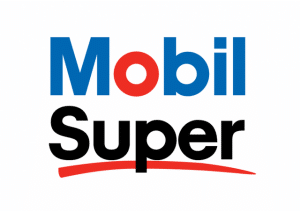 Mobil Super
Mobil Super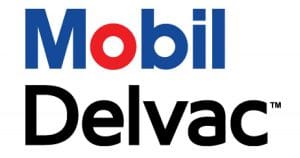 Mobil Delvac
Mobil Delvac
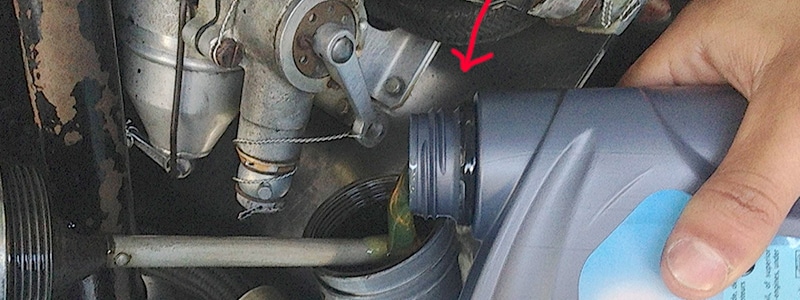

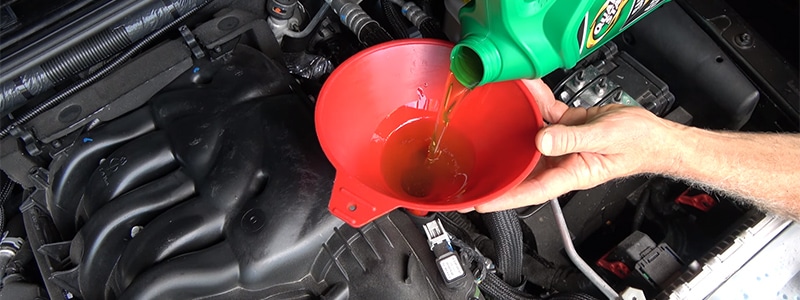
My late husband liked to mix his coffee and Mobil 1 Synthetic in the morning to get his butt in gear. When he’d come home he’d fill up my “D cup” with Castrol GTX Ultraclean and caster oil. What a mess, but it was fun to watch him scamper to the toillet!
Joking aside
Your supposition that a higher number under the w banner is completely false.
IE 15w40 is better in winter than 5w40. This is incorrect as the lower the number the lower the viscosity at x degrees which means instead of treacle you have water (sic) to flow around cold engine.
Thanks sorry if that was confusing, the point we were trying to make is just that Castrol has more cold options. You are absolutely correct that the higher the number the better it will be able to maintain its viscosity.